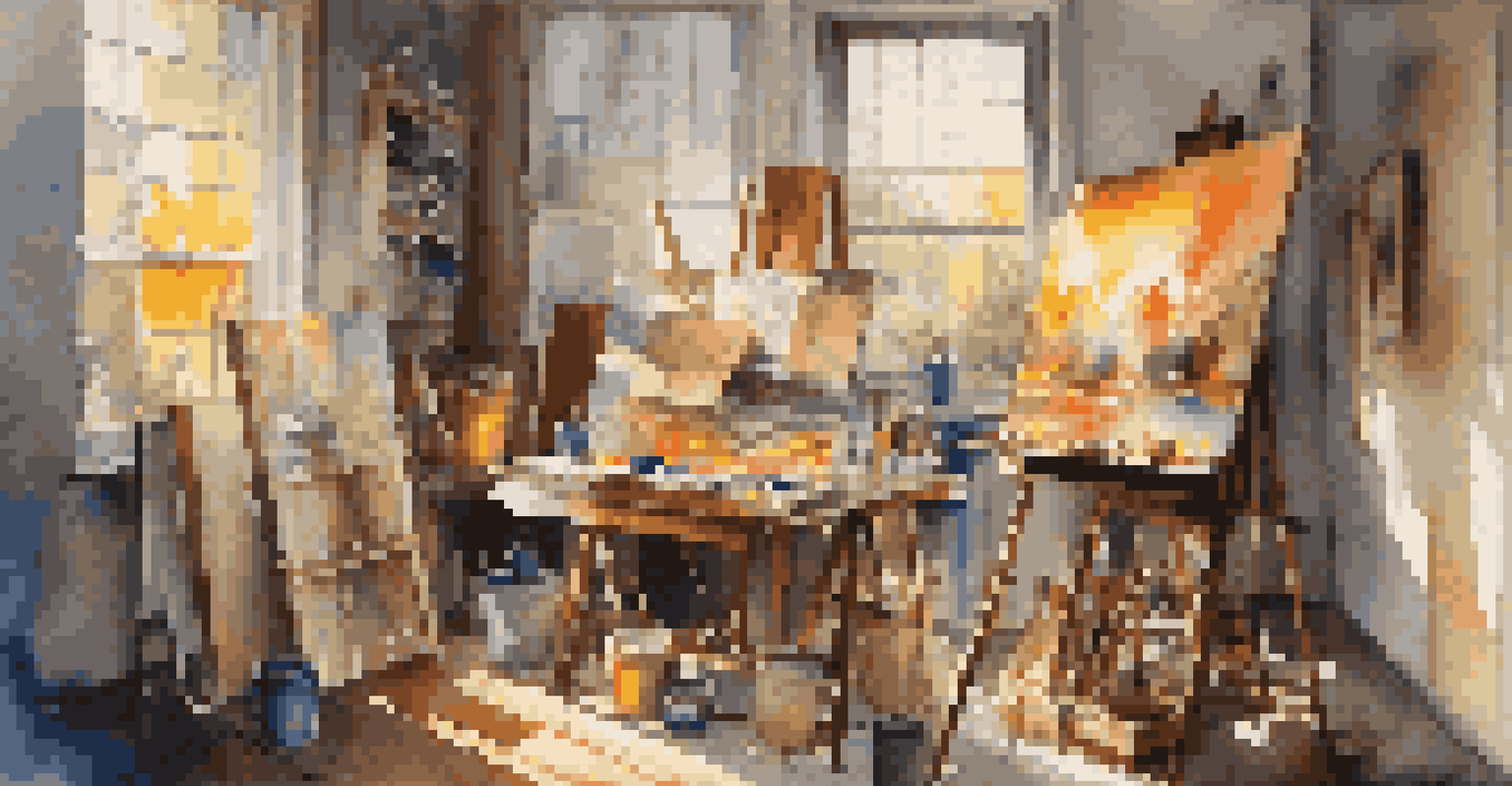AI and Intellectual Property Rights: Ethical Dilemmas

Understanding AI and Its Role in Creative Processes
Artificial Intelligence (AI) is revolutionizing creative fields by producing art, music, and writing at unprecedented speeds. With algorithms that analyze vast amounts of data, AI can generate content that mimics human creativity. However, this raises questions about the originality of such outputs—when does a creation become truly 'original' if it’s generated by code and not human thought?
Artificial intelligence is not a substitute for human creativity, but rather a tool that can enhance and amplify it.
For instance, consider an AI that composes music by learning from thousands of existing songs. While the resulting piece may sound unique, the foundation of its creation lies in the pre-existing works, leading to discussions about credit and ownership. This interplay between AI and creativity is where ethical dilemmas begin to surface, as it challenges our traditional definitions of authorship.
As AI continues to evolve, we must grapple with these questions: Who is the true creator? Can machines hold intellectual property rights? These dilemmas are not just theoretical; they affect artists, developers, and the legal landscape surrounding creative expression.
The Concept of Copyright in the Age of AI
Copyright is designed to protect creators' rights, ensuring they can control how their work is used and distributed. However, when AI generates content, the question arises: who holds the copyright? Traditionally, copyright law has been clear about human authorship, but AI complicates this framework, leading to legal gray areas.

For example, if an AI creates a painting that sells for a high price, should the credit go to the programmer, the user, or the AI itself? Current laws often don’t account for non-human creators, which can leave artists vulnerable and disoriented in a rapidly changing landscape. This lack of clarity can also discourage innovation, as creators may fear legal repercussions.
AI Challenges Traditional Authorship
As AI-generated content blurs the lines of authorship, questions arise about who truly holds copyright and ownership rights.
As we consider potential reforms, it’s crucial to strike a balance that protects human creators while also acknowledging the role of AI in the creative process. This ongoing dialogue is essential for shaping future copyright laws that are both relevant and effective.
Ethical Implications of AI-Generated Content
The use of AI in generating content brings forth significant ethical considerations, particularly regarding authenticity and representation. When AI produces music or art, it often draws from existing works, which can unintentionally perpetuate biases or misrepresent cultures. This raises concerns about cultural appropriation and the authenticity of the output.
The real danger is not that computers will begin to think like men, but that men will begin to think like computers.
An example of this is an AI trained predominantly on Western music, which may struggle to accurately replicate or respect non-Western musical traditions. This can lead to a homogenization of culture, where unique voices are overshadowed by algorithmic trends. As creators, we must consider the implications of using AI tools in a way that respects and honors diverse cultural narratives.
Navigating these ethical waters requires a commitment to transparency and responsible AI usage. By being mindful of the sources and influences that shape AI-generated content, we can work towards a more inclusive and respectful creative landscape.
Challenges in Regulating AI and Intellectual Property
Regulating AI and intellectual property rights poses unique challenges for lawmakers and society. The rapid pace of technological advancements often outstrips existing legal frameworks, leaving gaps that can be exploited. For instance, without clear regulations, individuals or companies could misuse AI-generated content without accountability.
Additionally, the global nature of the internet complicates enforcement. What’s legal in one country may not be in another, and cross-border disputes can arise when it comes to ownership and rights. This creates a patchwork of laws that can confuse creators and consumers alike.
Ethics of AI in Creative Fields
The use of AI in creativity raises ethical concerns about authenticity, representation, and cultural appropriation.
To address these challenges, a collaborative approach involving technologists, legal experts, and ethicists is essential. By working together, we can develop comprehensive regulations that protect intellectual property while fostering innovation in the AI space.
The Impact of AI on Traditional Creative Industries
As AI technologies advance, traditional creative industries are experiencing significant shifts. For example, in fields like music and visual arts, AI tools are becoming commonplace, allowing artists to enhance their creative processes. However, this also raises concerns about job displacement and the devaluation of human creativity.
Imagine a scenario where an AI can produce a hit song in minutes, potentially sidelining human songwriters. This may lead to a future where the role of human creators is diminished, prompting fears of a cultural landscape dominated by machine-made content. It’s crucial to consider how these changes will affect not just individual artists, but also the broader creative ecosystem.
To thrive in this new environment, artists may need to adapt by embracing AI as a collaborative tool rather than viewing it solely as competition. By finding ways to integrate AI into their work, they can enhance their creative output while ensuring that human artistry remains at the forefront.
Fostering Responsible AI Use in Creativity
To navigate the ethical dilemmas surrounding AI and intellectual property, it’s essential to promote responsible AI use in creative fields. This involves developing guidelines that prioritize ethical considerations and ensure fair use of existing works. By fostering a culture of respect and acknowledgment, we can mitigate potential conflicts over ownership and credit.
For instance, platforms that allow AI-generated content should implement measures that require users to disclose the sources and influences behind their creations. This transparency can help safeguard against misuse and promote a more ethical approach to AI-assisted creativity. Furthermore, encouraging collaboration between AI developers and artists can lead to innovative solutions that respect both human and machine contributions.
Future Collaboration Between Humans and AI
The future may see innovative partnerships between artists and AI, redefining creativity while necessitating the protection of human contributions.
Ultimately, by prioritizing ethical practices in the use of AI, we can create a more equitable creative landscape that benefits everyone involved, from artists to audiences.
The Future of AI and Intellectual Property Rights
The future of AI and intellectual property rights is still unfolding, and it holds both exciting possibilities and daunting challenges. As AI continues to advance, we must remain vigilant in adapting our legal and ethical frameworks to reflect these changes. This requires ongoing dialogue among stakeholders, including creators, technologists, and policymakers.
Looking ahead, we may see more defined roles for AI in creative processes, potentially leading to new forms of collaboration between humans and machines. Imagine a world where artists partner with AI to push the boundaries of creativity, creating works that blend human emotion with algorithmic precision. This dynamic could redefine what it means to be a creator in the digital age.

However, the road to this future won't be without obstacles. As we navigate the complexities of AI and intellectual property, it’s crucial to remain committed to protecting human creativity while leveraging the benefits of technology. The choices we make today will shape the creative landscape of tomorrow.